Democratic Job Approval
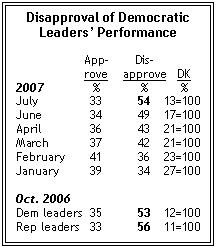
Public dissatisfaction with the performance of Democratic congressional leaders now stands at a new high for the 110th Congress. A 54% majority currently disapproves of the job Democratic leaders are doing, up from 49% a month ago and just 34% at the start of the legislative term in January. Barely one-in-three Americans (33%) approves of the job Democrats are doing — down from 39% at the beginning of the year.
Dissatisfaction with Democratic leaders’ performance now equals the levels of criticism of both Democrats and Republicans on the eve of the 2006 midterm election. In October of 2006, 35% approved and 53% disapproved of the job Democratic leaders were doing — the worst rating in Pew polling since 2001. Republican leaders received a virtually identical rating at that time (33% approve, 56% disapprove) — the most negative balance of opinion in more than twelve years of tracking this question going back to 1994.
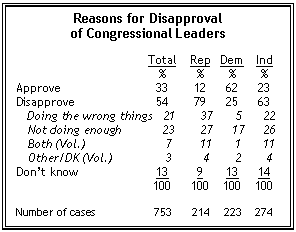
Not surprisingly, nearly eight-in-ten Republicans (79%) disapprove of the performance of Democratic leaders in Congress, while just 12% say they approve. But the balance of opinion also is decidedly negative among independents: Just 23% approve of Democratic leaders in Congress, while 63% disapprove. Most Democrats (62%) approve of their leaders’ performance, while a quarter (25%) disapproves. In all three groups, approval ratings have remained relatively stable since January, while disapproval has grown substantially. Among independents, disapproval is up 23 points from 40% in January, among Republicans disapproval is up 20-points from 59%, and among Democrats disapproval has nearly doubled from 13% in January to 25% today.
When asked why they disapprove, a plurality of Republicans say it is mostly because Congress is “doing the wrong things,” while most Democrats who give their leaders negative ratings say it is because they “are not doing enough.” Independents are more divided, with about as many saying they disapprove because Congress is underperforming as saying they disapprove because Congress is on the wrong track.
Pelosi More Visible, More Popular than Reid
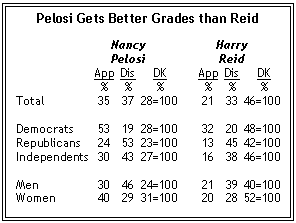
Roughly as many Americans approve (35%) as disapprove (37%) of Nancy Pelosi’s job performance as Speaker of the House, while 28% have no opinion. Far fewer are familiar with Harry Reid, but the balance of opinion is decidedly negative among those who are. Just 21% say they approve of the job Reid is doing as Senate Majority Leader, while 33% disapprove. Nearly half (46%) say they have no opinion of Reid either way.
So far Democrats are significantly more enthusiastic about Pelosi than Reid — they approve of Pelosi’s performance by a 53% to 19% margin, but approve of Reid’s performance by a narrower 32% to 19% margin. Among independents, more disapprove than approve of Reid by 38% to 16%, and more disapprove than approve of Pelosi as well, by a 43% to 29% margin.
There is a notable gender gap in ratings of Pelosi and Reid. More women approve than disapprove of Nancy Pelosi (40% vs. 29%), while men tend to view Pelosi negatively (30% approve, 46% disapprove). The positive impression women have of Pelosi does not carry over to Harry Reid — just 20% of women approve of Reid’s job performance (half as many as approve of Pelosi’s), while 28% disapprove and a 52% majority have no opinion of Reid.
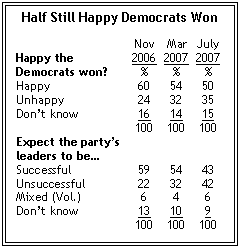
On Balance, More Still Happy Democrats Won
Despite growing dissatisfaction with the performance of Democratic Congressional leaders, half of Americans remain happy that the party won control of Congress in last year’s election, while just 35% are unhappy the Democrats won. This margin has narrowed considerably in recent months — right after the election more said they were happy than unhappy by a 60% to 24% margin. Among independents, more are happy than unhappy by a 52% vs. 28% margin, while Democrats are overwhelmingly happy (82% to 10%) and Republicans are overwhelmingly unhappy (14% to 75%).
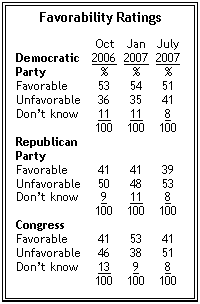
The public is divided over whether the Democrats will be successful (43%) or unsuccessful (42%) in getting their programs passed into law. Expectations have deteriorated significantly since the week following the election. At that time, 59% predicted a successful Democratic Congress and 22% an unsuccessful one. As recently as March, a 54% majority expected Democrats to succeed on their agenda, 11-points higher than today.
Despite these broad changes in job ratings and expectations, the Democratic Party’s overall image has suffered only slightly over the past six months. Slightly more than half (51%) views the party favorably, while 41% holds an unfavorable opinion. In January, the margin was 54% favorable and 35% unfavorable. And the Democratic Party’s image remains substantially stronger than the Republican Party’s, which has slipped since the start of the year. Currently, a 53% majority holds an unfavorable opinion of the GOP, up from 48% in January.
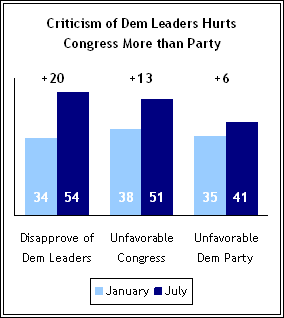
In fact, it is the image of Congress more generally — rather than of the Democratic Party — that may have suffered from growing skepticism about the effectiveness of the current leadership. As disapproval of the job Democratic leaders are doing has jumped 20-points since January, unfavorable views of Congress are up 13 percentage points, while disapproval of the Democratic Party has risen a more modest 6 points.
Republican views of Congress have shifted the most — the percent offering an unfavorable opinion of Congress is up from 34% to 56% since January. Independents, too, offer more negative opinions today (60%, up from 45% in January). By comparison, Democratic ratings of Congress are virtually unchanged (35% unfavorable, compared with 32% in January).
There is a large ideological divide among Republicans in ratings of Congress. Conservative Republicans offer more unfavorable (65%) than favorable (29%) marks, while moderate and liberal Republicans offer more favorable (57%) than unfavorable (36%) marks.
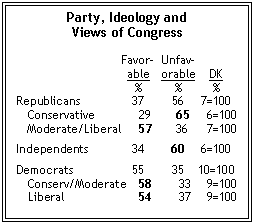
In this regard, conservative Republicans and independents stand out as the groups that are overwhelmingly critical of Congress. Moderate and liberal Republicans, by comparison, share with Democrats a generally favorable opinion of Congress.
President Bush and the Democratic Leadership
Democrats believe their party’s leaders are not pushing the president hard enough on the war while most Republicans say the Democratic leaders are going too far in challenging the president.
A plurality of the public (38%) currently believes that Democratic leaders in Congress are not going far enough in challenging the president’s Iraq policy. At the same time, 29% say the Democrats are going too far, up from 22% in June. About one-quarter (24%) think the Democratic leaders are handling the situation about right.
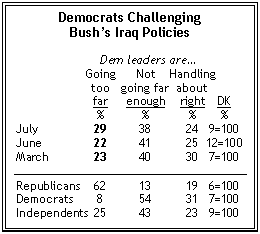
Shifts in sentiment among Republicans and independents are driving the recent change in perceptions that Democrats are becoming too critical of Bush’s handing of Iraq. The proportion of Republicans who feel that Democratic leaders have gone too far in challenging the president has increased 8 percentage points (from 54% to 62%), and 8 points as well among independents (17% to 25%). But a plurality of independents (43%) still favors a more aggressive approach in dealing with the president. A majority of Democrats (54%) continues to say party leaders aren’t doing enough to challenge Bush, a belief that has changed little over the past four months.


